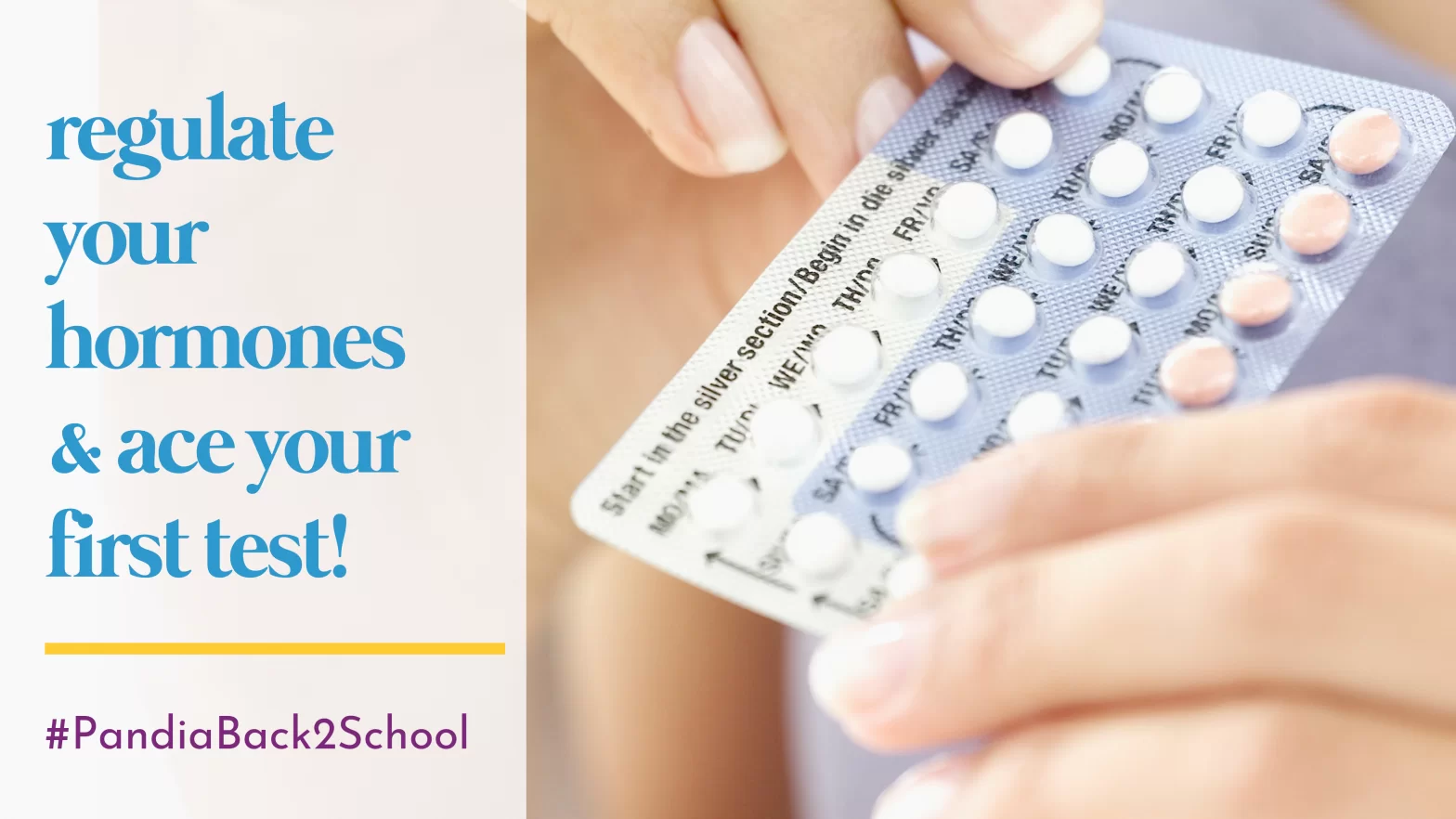Medically reviewed by Sophia Yen, MD, MPH – Written by Pandia Health Editorial Team
LifeHack: Regulate Your Hormones & Ace Your First Test. #PandiaBack2School
The worst part of school is arguably the exams. Exam days are the most dreaded days, the ones in which students give their all and pour out all they know on a certain topic into a few hours of testing. You’ll hear about people sharing about losing hours of sleep, pulling all-nighters, sacrificing social time, and emailing professors for last-minute help to be as prepared as they can be. This sounds like a nightmare, but with the right preparation, you don’t have to endure the struggle. This is done through preparing for a test ahead of time and getting the help you need in a timely manner.
With all the preparation and studying that comes with getting ready for big tests, the last thing anyone needs is something coming in the way and affecting the hard work they already put in. Unfortunately, the reality is that getting your period is an example of something can come in the way and impact your performance.
Getting your period comes with many side effects with people who get them knowing these side effects too well. A side effect that strongly affects mood is called premenstrual syndrome, commonly referred to as PMS, that appears a week or two before the period itself. Around 90% of all women of reproductive age experience some form of PMS, so it’s very likely that you or a friend has dealt with its symptoms.
What are the symptoms of PMS?
PMS symptoms include headache, bloating, tender breasts, and diarrhea. On top of these physical symptoms, there may be emotional and mental symptoms.
These include:
- mood swings
- irritability
- trouble sleeping
- tension and anxiety
- feelings of sadness
- a hard time sleeping
- trouble with concentration or memory
All of these symptoms, especially trouble with concentration or memory, can make it hard to be a student and focus in class.
Using Birth Control to Treat PMS:
For this next school year, get on your A game and say goodbye to PMS. An option to regulate your symptoms is with hormonal birth control. Birth control pills help to regulate hormones so that individuals are not subjected to wild, sudden, and severe fluctuations that can cause painful and uncomfortable symptoms. Without your hormones going wild, it is a much smoother ride to have your test prep go accordingly. The last thing I need while studying is to feel unmotivated and moody from PMS. If you are someone who struggles with PMS, hormonal birth control can be a good option for you.
When a woman is not taking the pill, her body will naturally produce estrogen within the first half of the menstrual cycle. During this time, estrogen tells the uterus to create the endometrial or uterine lining. The endometrium is where a fertilized egg will implant and form the placenta. When estrogen hits peak levels, one of the ovaries will release an egg. Once an egg is released, the body will produce progesterone hormones, which signals to the uterus to stop growing the endometrium.
If the egg is not fertilized, then both progesterone and estrogen fall. Once those levels bottom out, it signals to the uterus to shed the endometrium, thus resulting in a period. Some are more sensitive to these changes in hormones and will experience PMS and PMDD symptoms. However, taking oral contraceptives can diminish these hormone swings.
Every person is different, so it is important to try different hormonal contraceptive methods until you find one that works for your specific biochemistry. This holds true for almost all prescription medicines. Some studies show that women with a history of depression have a slight chance of experiencing worse moods when taking an oral contraceptive. It’s crucial to let your doctor know if you have a history of depression before trying the pill or switching contraceptives. In most cases though, low-dose combination birth control pills will not cause mood swings.
Other reasons to regulate your hormones using birth control:
Regulating your hormones with hormonal birth control not only regulates PMS symptoms, but may also help treat other conditions that come with menstruation.
These other symptoms include:
- Polycystic Ovary Syndrome (PCOS)
- Endometriosis
- Lack of periods (Amenorrhea)
- menstrual cramps
- Acne
In addition to using birth control to regulate PMS, you can also use it to safely skip your period (#PeriodsOptional) and not experience any symptoms that come with having a period. Safely turning off your period with birth control can be a good option for those who would like to skip your period in general. As a student, not worrying about your period is a huge stress reliever and one less thing to worry about.
Ace your tests this upcoming school year without PMS. It’s now simple, fast, and affordable to access birth control pills from the comfort of your own home. Pandia Health delivers birth control for FREE and has doctors who can write you online birth control prescriptions for your needs. Check out Pandia to see what birth control options you can use to alleviate mood swings and PMS discomfort.
Start stabilizing your hormones & get your FREE delivery of birth control! Sign up today!
The above information is for general informational purposes only and is NOT a substitute for professional medical advice. Always seek the advice of your doctor/primary care provider before starting or changing treatment.

